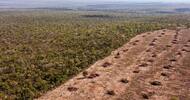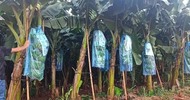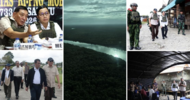Several investors with large agricultural leases are being investigated for illegal activities, including corruption, environmental destruction, and failure to uphold the terms of their contracts
Investigations by a coalition of international and Liberian NGOs reveal allegations that EPO security personnel and members of the elite Liberian Police Support Unit assaulted and arrested unarmed civilians
- Global Witness
-
20 December 2013
Governments of Ethiopia, UK, US and Germany sign land country partnership to work together to improve rural land governance for economic growth and to protect the land rights of local citizens in Ethiopia.
That palm oil listed in the ingredients of your favorite candy bar or lipstick? More and more of it comes from forest and farmland razed by multinational corporations a world away.
- On Earth
-
04 December 2013
Karuturi, like many other large-scale investors, underestimated the complexity of opening land for large-scale commercial agriculture.
- Bloomberg
-
26 November 2013
We, civil society organizations in Japan, call on the Japanese Ministry of Foreign Affairs (MOFA) and the Japan International Cooperation Agency (JICA), for the immediate suspension and fundamental review of the ProSAVANA program.
Act Now! and Bismarck Ramu Group call on PM to cancel special agriculture and business leases, saying that already 5 million ha of lands in Papua New Guinea have been swallowed up by foreign companies.
- Act Now!
-
22 September 2013
Large multinational corporations are swooping into Laos to acquire the land — or the rights to the resources that the land holds — from the local, regional and national governments.
- Thompson Reuters
-
16 September 2013
Are the government's large-scale developments in southern Ethiopia forcing local populations to move with the times or just move out the way?
- Think Africa Press
-
21 August 2013
Rising demand for agricultural commodities has led to a ‘land grab’ in some of the world’s poorest countries. The International Bar Associaiton assesses the legal implications and the prospects for the developing world.
Push to lure foreign investors has led to a rise in social problems, sparking fears of a return to conflict, warns NGO
A new report, ‘Who Is Benefitting?', examines the impact on local communities of large land leases held by three investors in Sierra Leone.
California think tank issues double-barreled report alleging Washington, London are willfully ignoring gross violations.
The Land Matrix partnership today launches its thoroughly updated dataset which allows tracking of large scale land acquisitions, from negotiation to implementation.
DFID documents reveal that, despite denials of funding forced relocations, British cash pays salaries of officials implementing the Ethiopian government's 'villagisation' programme.
Can contemporary large-scale land investments play a role in reducing poverty and inequality? If so, what influences the outcomes? A new research project is gathering data on three farming models – contract farming, plantations and commercial farming areas – in Ghana, Kenya and Zambia.
- Future Agricultures
-
19 May 2013
The bulk of oil palm operations are being carried out by the Palawan Palm & Vegetable Oil Mills Inc. and its sister company Agumil Philippines Inc., which were established through joint ventures between Filipino, Singaporean and Malaysian investors.
- InterContinental Cry
-
27 Mar 2013
Reading between the lines, the Durban BRICS resolutions will support favoured corporations' extraction and land-grab strategies and confirm the financing of both African land-grabbing and the extension of neo-colonial infrastructure through a new 'BRICS Bank'
The G8 countries are implementing a New Alliance for Food Security and Nutrition in six African countries that will facilitate the transfer of control over African agriculture from peasants to foreign agribusiness.
With the coming of big industrial farms in Ethiopia, local people, villagers and pastoralists are being threatened, intimidated, forcibly displaced and herded into camps by the military, their homes destroyed.
- Redress Information & Analysis
-
01 Mar 2013
The most comprehensive publication to date on land concessions and leases in Lao PDR has been presented to the public.
As land and water become scarce, as the earth’s temperature rises, and as world food security deteriorates, a dangerous geopolitics of food scarcity is emerging, writes Lester Brown
- The Futurist
-
03 January 2013
Lessons need to be learned to transform Africa's ‘resource curse’ into a ‘resource blessing’ and to mitigate against the negative impacts of large land-based investments.
Olam is working closely with the Government of Gabon where it has developed the Roundtable on Sustainable Palm Oil New Planting Procedure in Africa.
- HowWeMadeItInAfrica
-
30 October 2012
The Obama model's first project in Mozambique will be to support Cargill, the giant grain trader and largest private company in the world, to take 40,000 hectares of farmland.
- The Guardian
-
31 July 2012
The Ethiopian government is forcibly displacing indigenous pastoral communities inEthiopia’s Lower Omo valley without adequate consultation or compensation to make way for state-run sugar plantations, Human Rights Watch said in a report released today.
Singaporean and other foreign traders are taking advantage of a loophole in Thai laws to purchase land suitable for paddy fields and starting up rice-trading houses in Thailand.
Six foreign-owned companies are currently trying to secure over 1 million hectares (about 2.5 million acres) of land for the production of palm oil in the country's forested southern zone, according to a coalition of environmental organisations.
The G77 and China have alerted the UN General Assembly to the emerging trend of “massive acquisition by large investors from developed countries of farm land in developing countries”. The farm land is being bought not for food security, but for the speculative purpose of future agricultural production, which thus creates a significant added burden to food insecurity globally.
New studies released in London today suggest that the frenzied sell-off of forests and other prime lands to buyers hungry for the developing world's natural resources risk sparking widespread civil unrest—unless national leaders and investors recognize the customary rights of millions of poor people who have lived on and worked these lands for centuries.














